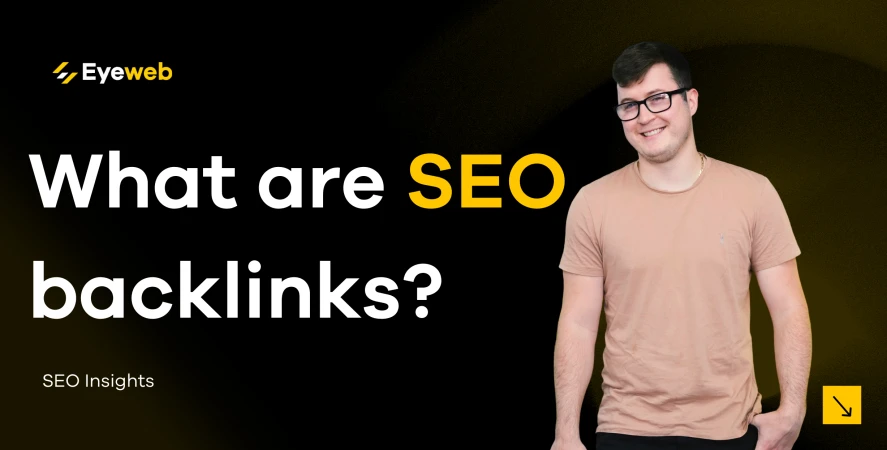In short, what is a link?
A backlink is an SEO term for when one website hyperlinks to another. This allows a user to be taken from one webpage to another. An SEO backlink specifically refers to when other websites link to your website, and a backlink can come in the form of a link on text, image or nav items.
Key terms to understand / Glossary:
Link = Hyperlink
Backlink = The specific text or image on a different website that links to your website
Internal Links = The specific text or image on your own website that links to another page (on your website)
Anchor text = The specific text that is used when somebody links your website
Referring Domain = A website that links to your website
URL = Website address, usually where the backlink takes users to on your website
Landing page = The first page users see when they enter your website (usually by clicking the link)
Backlink profile = An overview of all the websites and pages that link to your website
Why is it important?
Backlinks are important because they allow users to easily navigate between websites and content. Google uses them as a ranking factor when determining which content to display on search engines which is why you will hear about their importance all of the time from SEO agencies.
What does Google officially say about it?
Officially Google says a couple of important things about backlinks.
1 - Google doesn’t care about the total number of links pointing to your website. They use links on a case-by-case basis to determine how authoritative specific bits of content are.
2 - Google doesn’t want SEOs to build links and labels the practice as unnatural, which can even lead to penalties.
This leaves us in quite a predicament as SEOs, and they are a necessary part of your SEO strategy, but Google doesn’t like people trying to build links that wouldn’t come ‘naturally’.
Why does Google care about unnatural links?
As SEO has developed over the years, more and more people have tried to game the system in order to get their websites to appear higher up on Search Engines. This has sometimes led to low-quality web pages, spam and poor user experience. In order to combat this, Google has created systems to detect unnatural links and ignore them, or in worst cases, penalise sites engaging in this spammy behaviour. The algorithm that Google uses to detect and combat these spammy practices is called Penguin.
What is Domain Authority?
Domain authority is a metric made up by SEOs in order to easily summarise how many links a website has and the quality of them. Google doesn’t use domain authority when taking into account which web pages to rank higher on search results. There is also a metric called page authority, which is similar to domain authority but looks at examples on a page-by-page basis. This is a closer comparison to how Google would evaluate pages but oversimplifies the process compared to Google. Authority is usually scored on a 0-100 scale, being that 100 is the most authoritative a website can be vs 0, which would be a brand new website with no links.
Domain authority is a helpful score to determine how valuable a link is when trying to acquire backlinks. However, other things, such as monthly traffic, are more important and should be taken into account.
What is a nofollow vs a follow link ?
Nofollow and follow is an instruction applied to a link to suggest whether Google should crawl (follow) or not crawl (nofollow) it to its destination. If a nofollow link is set, then, in theory, Google bot will not pass page rank from the source to the destination page.
But why does this exist for backlinks?
Google prefer people who are engaging in sponsored content to apply a nofollow tag to their links. Sponsored content, for example, would be when a business sends free products or pays money for a website to review or talk about them. In Google’s eyes, this is an unnatural link and hence the nofollow instruction.
How do I get backlinks?
Produce good content and get it in front of the right people - Writing engaging content that adds value to your niche is the most likely content to get referred to by other websites. Things like creating new research, helpful resources or new information ways to add value. Making connections to influencers in your niche or relevant publications will allow you to reach out and publish your content.
Press - Digital PR is a great way of gaining backlinks. Journalists are always looking for information sources and contributors for articles, and publicity stunts are a great way to get people talking about your brand.
Find existing articles and contribute. This requires SEO tools and content tools to find articles already published that are relevant to your niche. You can then produce content that adds to these articles, reach out to the author and try to get added as a source.
Guest posting can be a way to get your content onto other people's blogs. Sometimes, they ask to contribute to your blog in exchange. This can be a great way to make connections and expand your natural reach.
Local SEO and backlinks
Backlinks are also an important part of our local SEO strategy. Getting links from other businesses in your locality is an important factor in Google’s location algorithm. Gaining backlinks from local directories is also an efficient way of building local references and citations. There are SEO tools which allow you to link your Google Business location to the syndication tool, and it will publish your business information across a variety of trusted local directories (such as Yell, Bing Places etc).
These are just a few of the many ways that people acquire SEO backlinks. If you need help with your SEO strategy, reach out to a member of our team today.


